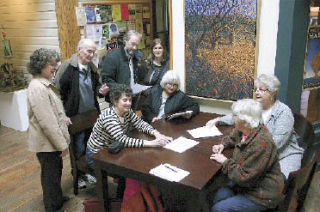BAYVIEW — It’s been nearly five years since President George Bush stood aboard the aircraft carrier USS Abraham Lincoln under a banner that proclaimed “Mission Accomplished” in Iraq.
Members of MoveOn Whidbey, an online-based activists group, don’t see it that way.
“Mission accomplished has not been accomplished,” said Mindy Thompson.
“Are you even sure what the mission is?” Connie Dawson asked.
About 10 members of the grassroots organization met at Bayview Corner Wednesday to brainstorm about what can be done to raise awareness and stop the Iraq war.
Someone suggested a billboard campaign — graphic images, with provocative slogans — a picture of coffins of fallen American troops superimposed with the words “Mission Accomplished.”
People have become desensitized to the war, the cost of the war and the rising number of casualties, the group said.
“People keep dying. It’s old news,” said Carolyn Tamler, MoveOn Whidbey’s coordinator.
That has to change, they said.
And they are not alone.
Nationwide, nearly 150 MoveOn events were planned this week for people to press their opposition to the war with elected officials. In Washington state, nine MoveOn events were held.
While some groups just met and made future plans, such as the one on South Whidbey, other people went to the offices of their representatives and visited senators and other lawmakers.
The largest event was held by the
Seattle MoveOn Council, where more than 125 people visited the Federal Building in downtown Seattle.
A report prepared by MoveOn, which was distributed this week to elected officials and other leaders, outlines how the money that has been spent on the Iraq war could be better spent on domestic priorities.
The United States has already spent $526 billion on the Iraq War, with
$83.8 billion in spending still pending — and the Bush administration is proposing another $139.4 billion for the next year, according to the report.
That means Washington’s share alone is $11,864,941,864.
“That’s unsustainable,” Marilyn Phillips said.
“I don’t think anybody has a way to comprehend what that means,” Tamler added.
According to the National Priorities Project, for the money being spent on the Iraq War, Washington could provide healthcare for more than 1.8 million
people, or hand out 1.9 million scholarships for university students or build 65,553 affordable homes.
That kind of money spent on the ongoing war doesn’t sit well with the activists, especially with the country facing a recession.
“I want my taxes to go to schools and hospitals,” Phillips said. “I don’t want my money to go to the death of another country.”
While economists may disagree on the costs of the war and its effect on the recession, some recognize that there are tradeoffs between Iraq spending and spending on domestic priorities.
“The government’s priorities clearly don’t match the people’s priorities,” Tamler said.
According to MoveOn polls, a majority of voters in Washington want to see the money being spent on the Iraq War used instead on domestic priorities. As the economy shows signs of distress everywhere, critics said the cost of the Iraq War is creating a heavy and increasing burden.
“The president said this week that we’re not in a recession, but 90 percent of the public has accepted that we are,” Tamler said.
But as people struggle to make a living, they have less energy to press for peace, she said.
“People become understandably very focused on their own lives,” Tamler said. “They are in survival mode.”
“I disagree,” Thompson said. “People are looking for somebody to blame.”
Robbie Cribbs said its upsetting that for the fifth year now, government continues to fund war-aiding industries while skimping on social services.
“They are taking away all the funding from social programs and taking it in the private sector,” he said.
“This is probably the hugest war profiteering that has ever gone on,” Tamler agreed.
War has become a lucrative business, the activists said, pointing to companies such as Blackwater and other firms that have received contracts during the ongoing conflict.
Another concern for local activists, however, is the absence of young people in the debate over the war. That was true again this week at the Bayview gathering.
Even though the average soldier killed in Iraq is in his 20s, the average age of the people that met at Wednesday’s meeting was much higher.
Tamler acknowledged that at the recent Island County Democrats convention in Langley many participants were under 25, but not many are actively protesting the war.
“They need to understand their future is at stake,” Phillips said.
“I have a nephew in Iraq. Before he left he said the morale was real low. He said, ‘Everyone knows we’re fighting a rich man’s war.’”
The activists said they would urge people to write and call their representatives to call for an end to the war. But one said that doesn’t go far enough.
“We need to write to our representatives that they prosecute Bush and Cheney,” Thompson said.
To learn more about MoveOn or join the group, go to the organization’s Web site at www.moveon.org.



